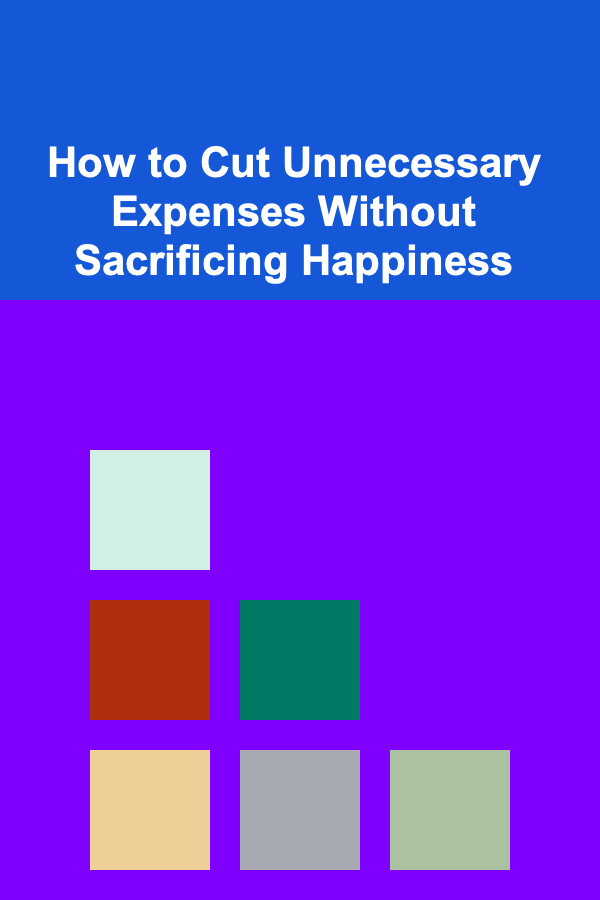
How to Cut Unnecessary Expenses Without Sacrificing Happiness
ebook include PDF & Audio bundle (Micro Guide)
$12.99$11.99
Limited Time Offer! Order within the next:

In today's fast-paced world, it's easy to fall into the trap of spending more than necessary, often on things that don't add significant value to our lives. Whether it's impulse shopping, dining out frequently, or subscribing to numerous services that we rarely use, unnecessary expenses can quickly drain our finances. However, cutting these expenses doesn't mean you have to sacrifice your happiness or quality of life. In fact, taking control of your spending can lead to more fulfillment, less financial stress, and the ability to direct your money toward things that truly enhance your well-being.
This guide will explore how to cut unnecessary expenses while ensuring that you maintain the things that bring you joy, fulfillment, and peace of mind.
Identify Your Unnecessary Expenses
The first step in cutting unnecessary expenses is to identify them. This requires a bit of introspection and an honest look at your spending habits. What are the expenses that are essential, and what are the ones that you could live without or reduce?
Track Your Spending
Start by tracking every dollar you spend for a month. You can do this manually with pen and paper, use a budgeting app, or even access your bank's transaction history. The goal is to see exactly where your money is going.
Once you've tracked your expenses, categorize them into two groups:
- Essential Expenses: These include rent/mortgage, utilities, food, healthcare, and transportation---things that you need for your survival and basic comfort.
- Non-Essential Expenses: These are the discretionary expenses---things that you could easily live without or reduce, such as dining out, subscriptions, and unnecessary purchases.
Reflect on Your Habits
When reviewing your spending, reflect on your habits. Are there patterns of behavior that lead you to spend unnecessarily? For instance:
- Do you tend to buy items you don't need when you're stressed, bored, or tired?
- Are you subscribed to multiple streaming services but only watch one or two?
- Do you often eat out or order takeout, even when you could prepare a meal at home?
These behaviors are common but often lead to overspending. Understanding why you spend in certain ways can help you make more mindful decisions in the future.
Cut Impulse Purchases
Impulse purchases are one of the main culprits behind unnecessary spending. We've all been there---walking into a store or browsing online, and before we know it, we've made a purchase that wasn't planned or necessary.
Understand the Psychology of Impulse Buying
Impulse buying is often driven by emotions rather than rational thinking. We may be seeking instant gratification, trying to fill an emotional void, or simply succumbing to marketing tactics. Retailers and online stores use strategies like limited-time offers and flashy advertisements to trigger impulsive purchases.
To cut down on these purchases, start by recognizing your triggers. These could be:
- Emotional States: Feeling sad, anxious, or bored may make you more susceptible to impulsive buying. Recognizing these emotions can help you pause and think before making a purchase.
- Advertising: Ads are designed to lure you into buying something you don't need. Turn off notifications for shopping apps or unsubscribe from email lists that tempt you to buy.
- Sales and Discounts: Just because something is on sale doesn't mean you need to buy it. Remind yourself that a "good deal" is only a deal if it's something you truly need or want.
Practical Strategies to Avoid Impulse Purchases
- Implement the 24-Hour Rule: Before making a non-essential purchase, give yourself 24 hours to think about it. Chances are, after a day, you'll realize that you don't need it.
- Create a Shopping List: Always go into a store or online marketplace with a specific list and stick to it. Avoid browsing without purpose.
- Use Cash Instead of Cards: Using cash limits the amount of money you can spend in a day, which can help prevent impulse buying. If you have a set budget for discretionary spending, once it's gone, you can't spend more.
- Delete Shopping Apps: If you tend to make purchases through your phone, delete or disable shopping apps to remove temptation.
Review and Cut Back on Subscriptions
Subscription services have become a huge part of modern life, offering convenience and entertainment. However, it's easy to accumulate subscriptions that you rarely use. Whether it's streaming services, magazine subscriptions, or apps, the cost of these services can add up quickly.
Evaluate Your Subscriptions
Look at the subscriptions you have and ask yourself:
- Am I using this service regularly?
- Does this subscription bring me value, or am I paying for something that I've forgotten about?
- Are there cheaper alternatives or free options available?
For example, you may have a gym membership that you haven't used in months, or a subscription to a streaming service that you rarely watch. Even small, recurring charges can add up to a significant amount over the course of a year.
How to Cut Back on Subscriptions
- Cancel Unused Subscriptions: If you're not using a service regularly, cancel it. You can always re-subscribe later if you find that you miss it.
- Downgrade Plans: Many services offer different tiers, and you might be paying for a premium plan that you don't need. Consider downgrading to a more affordable option.
- Share Accounts: For services like streaming platforms, consider sharing subscriptions with family members or friends, which can significantly lower your costs.
- Look for Free Alternatives: There are often free alternatives for paid subscriptions. For example, free workout apps or YouTube channels can replace a gym membership, and there are plenty of free movies and TV shows available online.
Reduce Dining Out and Takeout Costs
Eating out is a significant expense for many people. While dining out can be an enjoyable experience, doing it too often can add up quickly and take a big chunk of your budget. The key is to find a balance that allows you to enjoy the experience without overdoing it.
Plan Your Meals
Meal planning is a powerful tool for cutting dining-out expenses. By planning your meals for the week, you can ensure you're cooking at home and making the most of what you already have in your kitchen.
- Plan Your Grocery List: When you plan your meals, create a shopping list based on the ingredients you'll need. Stick to the list when you go to the store to avoid buying items that aren't essential.
- Batch Cooking: Prepare meals in bulk so that you have leftovers for lunch or dinner throughout the week. This reduces the temptation to eat out when you're short on time or energy.
- Cook in Bulk: Making larger portions and freezing them can save time and money. For instance, soups, stews, and casseroles can be made in big batches and stored for later use.
Cut Back on Takeout
Takeout and delivery services are convenient but often come with high markups. To reduce takeout expenses:
- Limit Takeout to Special Occasions: Instead of ordering takeout multiple times a week, save it for a treat on weekends or when you're celebrating something special.
- Cook Your Favorite Takeout Dishes at Home: Many popular takeout dishes can be made at home for a fraction of the cost. Look up recipes for your favorite dishes and try making them yourself.
- Take Advantage of Leftovers: Rather than ordering takeout when you're tired, repurpose leftovers into new meals. This will help you avoid food waste and save money.
Be Mindful of Your Energy Consumption
Small changes in your energy usage can lead to significant savings over time, and many of these changes won't impact your lifestyle or happiness.
Reduce Utility Bills
- Unplug Devices: Many electronics consume power even when they are turned off. Unplug devices when not in use, or use a power strip to easily turn off multiple devices at once.
- Switch to Energy-Efficient Bulbs: LED bulbs use far less energy than traditional incandescent bulbs and can last much longer.
- Set Thermostats Efficiently: In the winter, lower your thermostat a few degrees, and in the summer, raise it. Consider investing in a programmable thermostat to regulate temperature automatically.
Water Conservation
- Fix Leaky Faucets: A leaky faucet can waste gallons of water over time. Fixing leaks can save you money on your water bill.
- Take Shorter Showers: Reducing your shower time by a few minutes can lower your water usage and energy costs.
Simplify Your Life and Focus on What Matters
Ultimately, cutting unnecessary expenses isn't about depriving yourself or living a life of scarcity. It's about simplifying your lifestyle and focusing on what truly adds value to your life. Often, we accumulate expenses because we feel the pressure to keep up with trends, society's expectations, or our own desires for instant gratification.
Reevaluate Your Priorities
Take a step back and think about what truly makes you happy. Is it material possessions, or is it experiences, relationships, and personal growth? By realigning your spending habits with your true priorities, you can reduce unnecessary expenses without feeling deprived.
Embrace Minimalism
Minimalism isn't just about owning less; it's about living with intention. By embracing a minimalist approach to your possessions, you can focus on the things that bring true value and joy to your life. This could mean decluttering your home, focusing on meaningful experiences, and purchasing items that you truly need or love.
Conclusion
Cutting unnecessary expenses is not about sacrificing happiness; it's about making intentional choices that align with your values. By identifying areas where you can reduce spending, prioritizing your happiness, and making thoughtful adjustments, you can save money without compromising the things that bring you joy. The key is balance---living within your means while still enjoying life's simple pleasures. Through mindful budgeting and conscious decisions, you can take control of your finances and create a life that's both financially stable and personally fulfilling.

How to Add Value to Your Home Through Renovation
Read More
How to Create an Efficient Laundry Room Storage Solution
Read More
How to Offer Personal Styling Services Online
Read More
How to Use Natural Cleaning Products for a Safe Home Environment
Read More
The Pros and Cons of Lowering Auto Insurance Deductibles: What You Need to Know
Read More
Top Tips for Finding and Using the Best Coupon Deals Online
Read MoreOther Products

How to Add Value to Your Home Through Renovation
Read More
How to Create an Efficient Laundry Room Storage Solution
Read More
How to Offer Personal Styling Services Online
Read More
How to Use Natural Cleaning Products for a Safe Home Environment
Read More
The Pros and Cons of Lowering Auto Insurance Deductibles: What You Need to Know
Read More